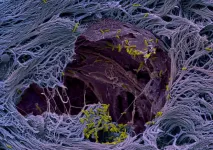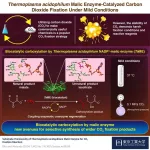(Press-News.org) Embargoed for release: Monday, June 10, 7:00 AM ET
Key takeaways:
People whose diets most closely adhered to the Planetary Health Diet (PHD) had 30% lower risk of premature death compared to those with the lowest adherence.
Every major cause of death, including cancer, heart disease, and lung disease, was lower with greater adherence to this dietary pattern.
Diets adhering to the PHD pattern had substantially lower environmental impact, including 29% lower greenhouse gas emissions and 51% less land use.
Boston, MA—People who eat a healthy, sustainable diet may substantially lower their risk of premature death in addition to their environmental impact, according to a new study led by Harvard T.H. Chan School of Public Health. It is the first large study to directly evaluate the impacts of adherence to recommendations in the landmark 2019 EAT-Lancet report. The researchers have named the dietary pattern outlined in the report—which emphasizes a variety of minimally processed plant foods but allows for modest consumption of meat and dairy foods—the Planetary Health Diet (PHD).
The study will be published online June 10 in The American Journal of Clinical Nutrition.
“Climate change has our planet on track for ecological disaster, and our food system plays a major role,” said corresponding author Walter Willett, professor of epidemiology and nutrition. “Shifting how we eat can help slow the process of climate change. And what’s healthiest for the planet is also healthiest for humans.”
While other studies have found that diets emphasizing plant-based foods over animal-sourced foods could have benefits for human and planetary health, most have used one-time dietary assessments, which produce weaker results than looking at diets over a long period of time.
The researchers used health data from more than 200,000 women and men enrolled in the Nurses’ Health Study I and II and the Health Professionals Follow-Up Study. Participants were free of major chronic diseases at the start of the study and completed dietary questionnaires every four years for up to 34 years. Participants’ diets were scored based on intake of 15 food groups—including whole grains, vegetables, poultry, and nuts—to quantify adherence to the PHD.
The study found that the risk of premature death was 30% lower in the top 10% of participants most closely adhering to PHD compared to those in the lowest 10%. Every major cause of death, including cancer, heart disease, and lung disease, was lower with greater adherence to this dietary pattern.
In addition, the researchers found that those with the highest adherence to the PHD had a substantially lower environmental impact than those with the lowest adherence, including 29% lower greenhouse gas emissions, 21% lower fertilizer needs, and 51% lower cropland use.
The researchers noted that land use reduction is particularly important as a facilitator of re-forestation, which is seen as an effective way to further reduce levels of greenhouse gases that are driving climate change.
“Our study is noteworthy given that the U.S. Department of Agriculture has refused to consider the environmental impacts of dietary choices, and any reference to the environmental effects of diet will not be allowed in the upcoming revision of the U.S. Dietary Guidelines,” said Willett. “The findings show just how linked human and planetary health are. Eating healthfully boosts environmental sustainability—which in turn is essential for the health and wellbeing of every person on earth.”
Other Harvard Chan School authors included Linh Bui, Fenglei Wang, Qi Sun, Frank Hu, Kyu Ha Lee, and Marta Guasch-Ferre.
The study was funded by National Institutes of Health (NIH) research grants UM1 CA186107, P01 CA87969, R01 HL034594, U01 CA176726, U01 CA167552, R01 HL035464, R01 DK120870, and R01 DK126698.
“Planetary Health Diet Index and risk of total and cause specific mortality in three prospective cohorts,” Linh P. Bui, Tung T. Pham, Fenglei Wang, Boyang Chai, Qi Sun, Frank B. Hu, Kyu Ha Lee, Marta Guasch-Ferre, Walter C. Willett, The American Journal of Clinical Nutrition, June 10, 2024, doi: 10.1016/j.ajcnut.2024.03.019
Visit the Harvard Chan School website for the latest news, press releases, and multimedia offerings.
###
Harvard T.H. Chan School of Public Health brings together dedicated experts from many disciplines to educate new generations of global health leaders and produce powerful ideas that improve the lives and health of people everywhere. As a community of leading scientists, educators, and students, we work together to take innovative ideas from the laboratory to people’s lives—not only making scientific breakthroughs, but also working to change individual behaviors, public policies, and health care practices. Each year, more than 400 faculty members at Harvard Chan School teach 1,000-plus full-time students from around the world and train thousands more through online and executive education courses. Founded in 1913 as the Harvard-MIT School of Health Officers, the School is recognized as America’s oldest professional training program in public health.
END
Scientists at the Broad Institute of MIT and Harvard have improved a gene-editing technology that is now capable of inserting or substituting entire genes in the genome in human cells efficiently enough to be potentially useful for therapeutic applications.
The advance, from the lab of Broad core institute member David Liu, could one day help researchers develop a single gene therapy for diseases such as cystic fibrosis that are caused by one of hundreds or thousands of different mutations in a gene. Using this new approach, they would insert a healthy copy of the gene at its native location in the genome, rather than having to create a different ...
How do pathogens invade the lungs? Using human lung microtissues, a team at the Biozentrum of the University of Basel has uncovered the strategy used by a dangerous pathogen. The bacterium targets specific lung cells and has developed a sophisticated strategy to break through the lungs’ line of defense.
Earlier this year, the WHO published a list of twelve of the world’s most dangerous bacterial pathogens that are resistant to multiple antibiotics and pose a grave threat to human health. This list includes Pseudomonas aeruginosa, a much-feared nosocomial pathogen ...
Around two million years ago, Earth was a very different place, with our early human ancestors living alongside saber-toothed tigers, mastodons, and enormous rodents. And, depending on where they were, they may have been cold: Earth had fallen into a deep freeze, with multiple ice ages coming and going until about 12,000 years ago. Scientists theorize that ice ages occur for a number of reasons, including the planet’s tilt and rotation, shifting plate tectonics, volcanic eruptions, and carbon dioxide levels in the atmosphere. ...
Lasers have revolutionized the world since the 60’s and are now indispensable in modern applications, from cutting-edge surgery and precise manufacturing to data transmission across optical fibers.
But as the need for laser-based applications grows, so do challenges. For example, there is a growing market for fiber lasers, which are currently used in industrial cutting, welding, and marking applications.
Fiber lasers use an optical fiber doped with rare-earth elements (erbium, ytterbium, neodymium etc) as their optical gain source (the part that produces the laser’s light). They emit high-quality beams, they have high power output, and they are efficient, ...
ROCKVILLE, Md.— New research reveals that moderate to vigorous physical activity in the evening for sedentary adults with overweight and obesity is most beneficial in lowering daily blood sugar levels, according to a study published in Obesity, The Obesity Society’s (TOS) flagship journal.
Experts explain that it has been well established that moderate to vigorous physical activity enhances glucose homeostasis in adults with overweight and obesity who are at higher risk of developing insulin resistance. ...
ROCKVILLE, Md.— Individuals treated with anti-obesity medications generally experience reduced appetite, which typically leads to reduced food intake. As a result, dietary quality becomes more important because nutritional needs must be met within the context of eating less. To improve this process, medical experts have developed a list of evidence-based nutritional recommendations to assist clinicians treating patients with anti-obesity medications, according to a review published in the journal Obesity, The Obesity Society’s (TOS) flagship journal.
“Our evidence-based review aims to equip clinicians with knowledge ...
Boys are good at math, girls not so much? A study from the University of Zurich has analyzed the social mechanisms that contribute to the gender gap in math confidence. While peer comparisons seem to play a crucial role for boys, girls’ subjective evaluations are more likely to be based on objective performance.
Research has shown that in Western societies, the average secondary school girl has less confidence in her mathematical abilities than the average boy of the same age. At the same time, no significant difference ...
Carbon capture and utilization technologies for the conversion of carbon dioxide into carboxylic acids have garnered attention recently, with researchers from Tokyo Tech recently demonstrating a biocatalyzed carboxylation reaction of not only natural substrate, pyruvate, but also unnatural one, 2-ketoglutarate, using Thermoplasma acidophilum NADP+- malic enzyme under mild reaction conditions. The proposed strategy can be tailored for the selective synthesis through carbon dioxide fixation reactions.
Removing the excess carbon dioxide (CO2) from the environment is not the end goal of the decarbonization process necessary to ...
Among US veterans diagnosed with lung cancer through the Veterans Health Administration healthcare system, those who underwent screening before diagnosis were more likely to be diagnosed with earlier stage disease and had a higher cure rate than those who had not been screened. The findings come from an observational study published by Wiley online in CANCER, a peer-reviewed journal of the American Cancer Society.
Lung cancer is the leading cause of cancer deaths worldwide, and most patients are diagnosed at ...
Peer-reviewed – Observational study - People
Adolescents who experience higher levels of social anxiety symptoms are more likely to report increased suicidal thoughts and other depressive symptoms two years later, according to new research.
The University of East Anglia-led study sheds light on the pressing need for early interventions to address society anxiety in young people.
Lead author Dr Kenny Chiu, Clinical Lecturer in Clinical Psychology at UEA’s Department of Clinical Psychology and Psychological Therapies, said: “Social Anxiety Disorder ...


